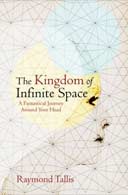
The Kingdom of Infinite Space: A Fantastical Journey Around Your Head
by Raymond Tallis
324pp, Atlantic, £19.99
A drunkard scans the pavement under a street lamp for his lost key; he knows it can't be there, but at least the light is. This, says Raymond Tallis, is the position of most contemporary philosophers trying to solve the murky problem of consciousness. They focus on the brain, since that, at any rate, can be scientifically observed, and end up denying the reality of subjective experience, which is precisely what they were seeking to explain. Tallis is not a professional philosopher, but for years he has single-handedly taken on the philosophical establishment in his campaign against what he calls "neuromythology", attacking big shots like Daniel Dennett, who probably never bother to reply. His battle against the scientistic de-grading of humans is all the more telling for being conducted with no religious agenda and from a scientific basis. A distinguished doctor and (now emeritus) professor of geriatric medicine at Manchester University, he puts his expertise to good use, but mainly appeals to first-hand knowledge available to any of us - the experience of being a conscious agent in an organic body.
"Look into a mirror," begins the first chapter of his latest book. The head staring back at you is your head, but why, asks Tallis, does it feel so intrinsically your own? Seen by others, or by you in the mirror, it is just one object among many - opaque, destructible, one day to be a receptacle for worms. Yet it invisibly holds everything that you perceive or think about, as if containing the world that contains it. And by the same weird Moebius curve, your thought about this (or anything else) is both an event that happens personally to you during a particular period of time, and a timeless, impersonal statement, that could in principle be made by anyone, about something outside you. Which is why most of the time you are unaware of your head, although sometimes it horribly becomes just another part of the world. Feeling yourself observed, concentrating on your headache, using your head as a weapon with which to butt someone, transforms it into a thing or a tool separate from you, the agent and observer.
"You" - who are you? What is the vanishing point where scattered thoughts and perceptions converge and yet are kept duly distinct? That is Tallis's perpetual question. Anglo-American philosophy is now so technical, so meticulous, such a miniature chess game between experts, that it is quite removed from life. Not surprising then that the intelligent reader resorts to amateur or discursive philosophers, who often just dilute "great ideas" into truisms, but may, as in Tallis's case, keep sight of the big, important questions and the sense of wonder in which philosophy originated. Tallis tackles Anglo-American philosophy, but in a European philosopher's style. He cites the famous story of how, in 1932, in a Parisian cafe, Raymond Aron pointed to an apricot cocktail saying, "That is all you need in order to do philosophy", and how Sartre went pale with excitement, thereafter adopting this phenomenological method, taking everyday experiences and transforming them into striking archetypes of the human condition. Tallis employs the same technique. He uses meditations on the head and its functions as his entrée into what we are.
But does phenomenological investigation do more than crystallise experience? Does it tell us anything new about the nature of consciousness? Sartre would often take off from a clever aperçu and push it into some generalisation about human beings that was striking but strained and ludicrous, quite cutting us off from our genetic and biological roots or our social bonds. Tallis laments phenomenology's failure - how it can never progress beyond subjective experience to its place in a scientific account of the world. He himself aims to do better, by recounting which biological facts accompany any feeling-of-what-it-is-like. By his own principles, of course, Tallis cannot hope to heal the physical/mental divide, but his mission is to remind us of its intractibility. He delineates the wavering cusp between experience and fact, the uncontrolled and the deliberate, being and having, acting and being acted upon - the gap in the "self-divided creature" we are. Much of what was once purely instinctive and involuntary, he stresses, has been made deliberate, social, meaningful. The head often acts independently of its owner; it, not you, secretes saliva, but equally, you can summon up saliva to spit at someone, or cough to make your presence known or signify disapproval. Biological givens have been somehow taken over by "us".
Tallis stalks the essence of experience, tries to pinpoint the borderline where sensation peters out into nothingness, as when, in waking up, "you can't creep up on your own undarkening", or when the cold orange juice you have just drunk becomes, as you feel it slipping down your gullet, "a torch lighting up the darkness within the body". In passages like these, you sense how much he enjoys sharing his exuberance.
Sometimes he is self-indulgent, facetious, a bit too pleased with himself, but at his best he does, 38 years later, what the philosopher Thomas Nagel did in his seminal "What is it like to be a bat?" and reminds us of the glory of human beings, and that we can't just be squashed down into being part of nature but always have (and are) a periscope overlooking it. This might seem fairly obvious, and so it should be, but with the bewildered integrity of the child who points out that the emperor has no clothes, Tallis reminds us of the surprising obtuseness of clever academics when they fail to see what's right in front of their noses. On Liberty by John Stuart Mill, with an introduction by Jane O'Grady, is published by Wordsworth Editions.

